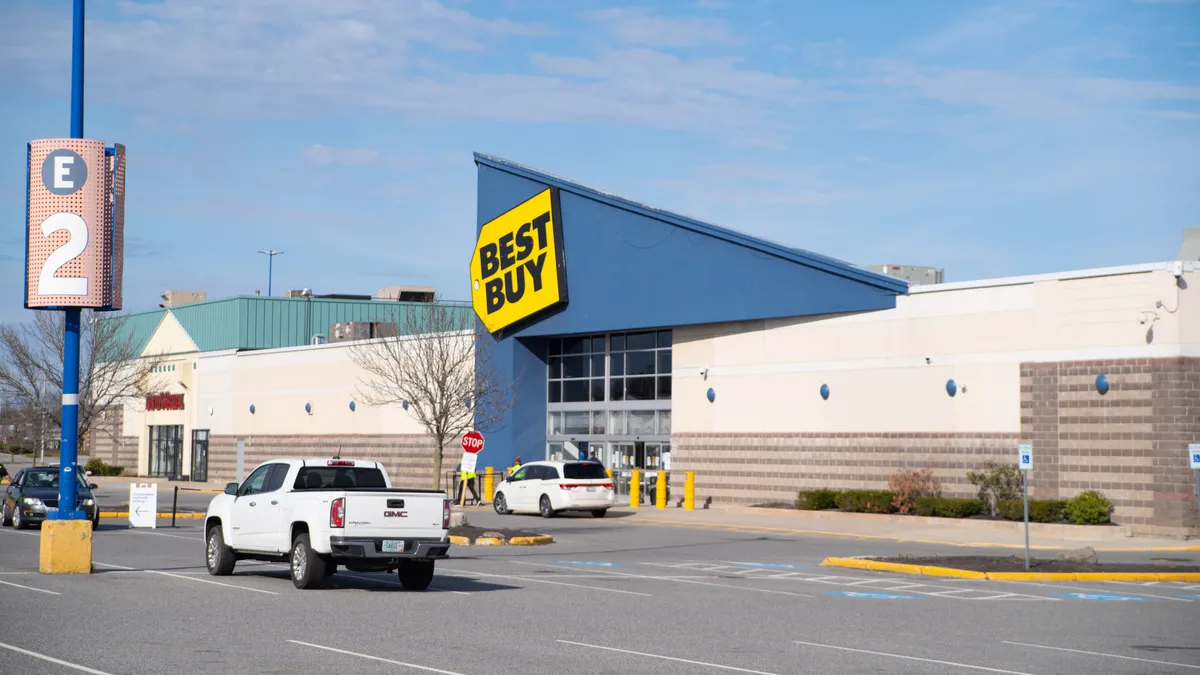Dive Brief:
- Best Buy will commit more than $44 million over a five-year period to achieve a set of diversity, inclusion and representation goals by 2025, the company announced Dec. 9.
- Among other goals, Best Buy is seeking a more diverse employee base; the company said it seeks to fill 1 in 3 new, non-hourly corporate positions with candidates who are Black, Indigenous and people of color (BIPOC). Additionally, it plans to fill 1 in 3 new, non-hourly field roles with female candidates. Best Buy also said it seeks to create "parity in retention rates" as well as change its senior leadership ranks to be "more in line with the diversity of CEO direct reports and company Board of Directors," it said.
- The investment will cover community engagement efforts, including $44 million to expand college prep and career development opportunities for BIPOC students including 16 scholarships for students at historically Black colleges and universities. Best Buy will also build a network of at least 100 "teen tech centers" to create skill development opportunities for teens in disinvested communities.
Dive Insight:
Best Buy's announcement is comparable to similar initiatives put forward by some large U.S. firms in recent months. For example, PepsiCo announced in October a five-year initiative to increase Black representation in managerial roles by 30% and Hispanic representation by 10%, among other goals. A number of other firms have announced new D&I hiring measures in the wake of recent protests against systemic racism and racial inequality, creating a bevy of opportunities for leaders in the field.
Like Best Buy, other employers are also looking to address D&I within the communities in which they operate. Target, for example, announced in August a partnership with a vocational school based in its hometown of Minneapolis to open a learning and training center for Black students and students of color. Organizations have also addressed cultural aspects of D&I by encouraging employees to participate in initiatives with their co-workers and families. Thousands of employees at financial services organization TIAA participated in its "be the change" initiative, a series of programs aimed at raising awareness of racial injustice and community needs.
"We know it's incredibly important to our employees, customers and communities to show that we are committed to doing all we can to further economic and social justice," Best Buy CEO Corie Barry said in the company's statement. "In many ways, we have engaged in these issues for years — but now we're being bold about our commitments to hold ourselves accountable for this work we've promised to do."
The past year has also seen employers band together to tackle D&I issues, in some cases. A coalition of CEOs created in 2016, CEO Action for Diversity & Inclusion, has advocated for a number of changes both within and outside of member organizations, HR Dive reported in September. That includes the development of a scorecard, which measures company progress in areas such as accountability, by members of the coalition's financial services industry group.
Despite these attempts to improve diversity, inclusion and belonging, leading companies continue to face familiar hurdles. A September report by Forrester found employers "consistently failed" to make D&I a business priority, with limited budgets, lack of ownership and a failure to root D&I programs in "proven practices or research" inhibiting progress.
HR industry veteran Josh Bersin recently addressed D&I hurdles by saying that professionals in part may be focusing too closely on improving metrics. "Inclusion is the goal, diversity is the outcome," Bersin said in a November webinar, adding that ensuring employees have a sense of belonging in the workplace can help to drive many of the measures that employers often seek to improve.
Taking note of the need to ensure D&I initiatives are supported at the highest levels of their organizations, some employers continued the trend of tying executive pay to D&I outcomes. In 2020 alone, companies including Starbucks, Wells Fargo and Uber announced such measures.













